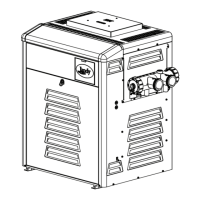Page 14
ENGLISH
Jandy
®
Legacy™ Model LRZE Pool/Spa Heater by Zodiac
®
|
Installation and Operation Manual
2. In Canada, CAN/CSA B149.1.
Avoid long horizontal runs of the vent pipe, and
90° elbows, reductions and restrictions. Horizontal
runs should have at least a 1/4 inch rise per foot
(20mm per meter) in the direction of ow.
Avoid terminating heater vents near air
conditioning or air supply fans. The fans can pick up
exhaust ue products from the heater and return them
inside the building, creating a possible health hazard.
Do not locate the vent terminal where ue
products could strike against building materials and
cause degradation.
Vent opening should be well away from trees
or other obstructions that would prevent free air ow
to and from vent terminal. Do not terminate the vent
under decks, stairways, or car ports.
Be sure to support all venting so that connections
will not separate and so that the weight of the vent pipe
does not rest on the heater draft hood. All connections
should be made with rustproof sheet metal screws.
Do not weld or fasten the vent pipe to the heater draft
hood. The draft hood and heater top must be easily
removable for normal heater service and inspection.
The draft hood outlet is to be connected to
an unobstructed vent pipe of the same diameter,
terminating outside the building. The vent must
terminate at least two (2) feet (0.6 m) above the
highest point of the roof or other object that is within
ten (10) feet (3.0 m) of the vent termination. The vent
pipe must have a listed vent cap which allows a full
equivalent opening for ue products, see Figure 5. The
top of the vent cap must be at least ve feet in vertical
height above the draft hood outlet.
Type “B” double wall or equivalent vent pipe is
recommended for the entire venting system. However,
single wall metal vent pipe may be used within
the structure as specied in the latest edition of the
National Fuel Gas Code ANSI Z223.1 or in Canada
CAN/CSA-B149.1
:Donotusesheetmetalscrewsat
thesnaplockjointsofTypeBgasvents.
When venting multiple appliances through one
common duct, each appliance must have its own vent
temperature limit switch. All vent limit switches must
be wired in series so as to prevent any appliance from
ring in the event of a blocked vent. Refer to ANSI
Z223.1 or, in Canada, to CAN/CSA B149.1 for more
information on multiple venting.
If the Legacy Model LRZ electronic is being
installed to replace an existing pool heater, it is
recommended that a new appropriate venting system
be installed with the new heater.
However, if an existing venting system must
be used, be sure to carefully inspect the venting
system to ensure that it is in good condition and
continues to be appropriate for the Legacy Model LRZ
electronic heater. Replace any parts that are not in
good and serviceable condition with new parts before
completing the pool heater installation.
Review the following general instructions before
continuing the installation.
DonotinstallLPgasunitsindoors.
TheLegacyModelLRZpoolandspaheatersare
designedforusewitheithernaturalgasorLPgas.
Checktheratingplateontheinnerpaneltobesure
thattheheaterisdesignedtousethetypeofgas
beingsupplied.
Lesappareilsdechauffageàfaiblesémissions
LegacyModelLRZpourpiscinesetcuves
thermalessontconçuspourêtreutilisésavecdu
gaznatureloudugazdepétroleliquéé(GPL).
Vériezl’informationinscritesurlaplaquesignalé-
tiquedupanneauintérieurpourvousassurerque
l’appareilestconçupourletypedegazfourni.
1. Gas piping installation must be in accordance
with the latest edition of ANSI Z223.1 and all
local codes. In Canada, the installation must be
in accordance with CAN/CSA B149.1 and all
local codes that apply.
2. Check the gas supply to be sure that it is the
same as the gas indicated on the heater’s rating
plate. Legacy Model LRZ electronic heaters, as
shipped from the factory, are certied to operate
within the altitude range indicated on the rating
plate. If a eld conversion to a different altitude
range should be necessary, manifold kits are
available for changing the altitude range of the
heater. See Table 1 in section 1.7.1 of this manual
to determine the correct altitude designation for
your heater. Refer to Section 11 “Parts List” to
order the correct part number of the manifold kit
needed. When changing the altitude range of the
heater, be sure to ll out the altitude conversion
label, included in the kit. Apply the label next to
the original rating plate.

